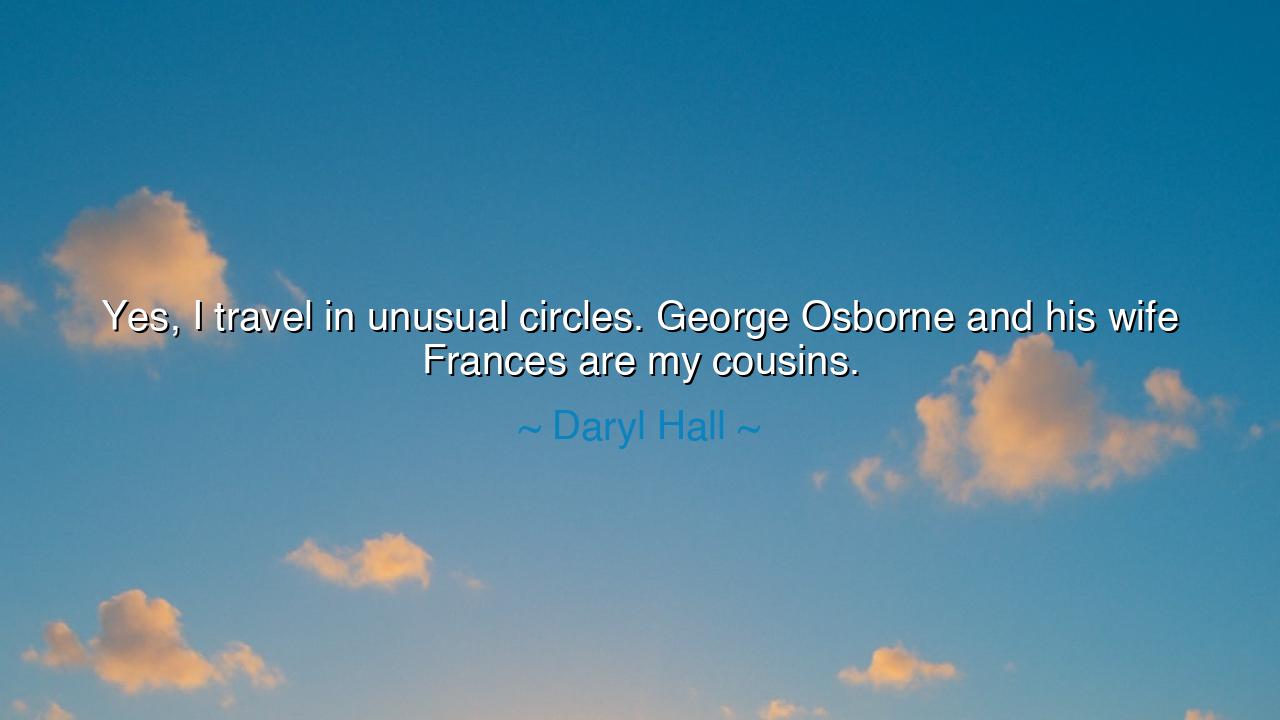
Yes, I travel in unusual circles. George Osborne and his wife






"Yes, I travel in unusual circles. George Osborne and his wife Frances are my cousins." Thus spoke Daryl Hall, musician of soul and rhythm, whose voice has carried across decades of song. In these words, spoken with ease and candor, lies a reflection not only of family ties but of the mystery of life’s networks—the unseen web of blood, fate, and circumstance that joins the worlds of art, politics, and power. What he calls unusual circles are not merely social curiosities, but symbols of how human lives interweave across the boundaries of profession, culture, and destiny.
The ancients, too, pondered such mysteries. They believed that men and women were not isolated beings but threads in a vast tapestry woven by the Fates. A soldier might find his cousin upon the throne; a poet might discover his kinship with merchants or generals. These connections, strange and unusual, reminded the wise that no life stands apart. Even the most different circles—those of the palace and those of the stage—may overlap in surprising ways.
In the story of Hall, the world of music meets the world of politics. On one side, the rhythm of soul, the voice that stirs crowds not with policy but with melody. On the other, the Osbornes, linked to the governance and debates of nations. What seems at first dissonant reveals harmony: for both spheres shape the lives of people, one through culture, the other through law. Hall’s remark, light though it seems, carries the deeper truth that kinship can bind together the most disparate worlds.
History shows us this again and again. Consider the poet Percy Bysshe Shelley, who married Mary, the daughter of William Godwin and Mary Wollstonecraft, figures of radical politics and philosophy. The circle of poets overlapped with that of revolutionaries, and their household became a crucible of new ideas. Or recall Leonardo da Vinci, who, though an artist, was drawn into the circles of dukes and kings, where his brushes and inventions mingled with the intrigues of power. Such unusual circles are not mere accidents—they are sparks where art and politics, culture and power, ignite transformation.
But there is also humility in Hall’s words. He does not claim greatness by his cousins’ name, nor diminish himself by comparison. He simply acknowledges: "I travel in unusual circles." Here lies wisdom. For in life, many will find themselves linked by blood or fate to worlds beyond their own. The danger is either to boast of it as if it defines us, or to reject it as if it stains us. Hall teaches a middle way: to recognize the connection without losing one’s own center.
O children of tomorrow, learn from this: your circles, too, may be unusual. You may find yourself tied by blood to those unlike you, or drawn by circumstance into spheres far from your chosen path. Do not be bewildered, nor ashamed. Instead, embrace the strangeness as part of the tapestry. For the greatness of humanity lies not in isolation, but in the meeting of different worlds. It is often at the crossroads—of music and politics, of art and power—that the deepest changes are born.
Therefore, let your life be open to unusual circles. Do not shrink into the narrow confines of your trade, nor despise the connections that fate has given you. Instead, honor them. Learn from them. Let them broaden your vision, temper your pride, and remind you that life is larger than the boundaries we draw. For as Hall’s words reveal, sometimes the strangest kinships bear the greatest lessons—that the world is one great circle, and we are all bound within it.






AAdministratorAdministrator
Welcome, honored guests. Please leave a comment, we will respond soon